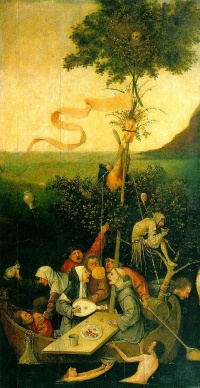Fool
From The Art and Popular Culture Encyclopedia
(Difference between revisions)
| Revision as of 19:43, 18 June 2016 Jahsonic (Talk | contribs) ← Previous diff |
Revision as of 19:44, 18 June 2016 Jahsonic (Talk | contribs) Next diff → |
||
| Line 2: | Line 2: | ||
| [[Image:Friar John and Panurge.jpg|thumb|right|200px|[[Friar John]] and [[Panurge]] give the ''[[Blason and contreblason du couillon]]'' by [[François Rabelais|Rabelais]]]] | [[Image:Friar John and Panurge.jpg|thumb|right|200px|[[Friar John]] and [[Panurge]] give the ''[[Blason and contreblason du couillon]]'' by [[François Rabelais|Rabelais]]]] | ||
| {{Template}} | {{Template}} | ||
| - | :''[[wise fool]]'' | ||
| A '''fool''' is a [[jester]], a [[clown]], a [[harlequin]] or a [[bouffon]]. [[Foolishness]] refers to the quality of having poor judgement or little intelligence. | A '''fool''' is a [[jester]], a [[clown]], a [[harlequin]] or a [[bouffon]]. [[Foolishness]] refers to the quality of having poor judgement or little intelligence. | ||
| ==Etymology== | ==Etymology== | ||
| Line 15: | Line 14: | ||
| ==See also== | ==See also== | ||
| + | |||
| + | * [[wise fool]]'' | ||
| * [[April Fools' Day]] | * [[April Fools' Day]] | ||
| * [[Folly]] | * [[Folly]] | ||
Revision as of 19:44, 18 June 2016
|
Related e |
|
Featured: |
A fool is a jester, a clown, a harlequin or a bouffon. Foolishness refers to the quality of having poor judgement or little intelligence.
Etymology
From Middle English fōl (“fool”) from Old French fol (French fou (“mad”)) from Latin follis.
Fool may also refer to:
- Illiterate
- Foolishness, the quality of having poor judgment or little intelligence
- The Fool (Tarot card), a Tarot card
- Fool (stock character), in literature and folklore
- Shakespearean fool, an archetypal character in numerous works by Shakespeare* Shakespearean fool, an archetypal character in numerous works by Shakespeare
- The Fool (design collective), a Dutch design collective and band influential in the psychedelic style of art in the 1960s
See also
- wise fool
- April Fools' Day
- Folly
- Feast of fools
- Fool's gold
- Folly (allegory)
- Illustration: Laughing Fool by a Netherlandish painter (possibly Jacob Cornelisz. van Oostsanen).
Unless indicated otherwise, the text in this article is either based on Wikipedia article "Fool" or another language Wikipedia page thereof used under the terms of the GNU Free Documentation License; or on research by Jahsonic and friends. See Art and Popular Culture's copyright notice.



